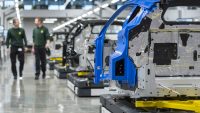Used car prices fell by just half a per cent this month, making it the strongest October for over a decade.
At the three-year mark, prices dropped by 0.5 per cent on average for second-hand cars.
The combination of October’s small drop, September’s surprising 0.3 per cent rise and there being no sign of normal new car supply levels returning any time soon, has lead one expert to believe a price crash won’t be around the corner.
Speaking exclusively to Car Dealer in a video you can watch above, Cap HPI’s director of valuations Derren Martin declared October’s market to be ‘strong’.
‘The headline figure of a 0.5 per cent decrease at the three-year point is mirrored across most of the age points, especially on younger ages which were around 0.4/0.5 per cent,’ he said in our video interview.
‘That’s a strong October; we’re not used to seeing massive drops because of what happened last year [where values rose by 30 per cent], and that 0.5 per cent drop is what we’ve seen at various months throughout the year. It’s a bit of a continuation of that.
‘It’s the strongest October we’ve witnessed since 2007 or 2008.’
He went on to say: ‘It’s been quite mixed for retailers, for the wholesale side October has performed pretty well.
‘Within that there’s obviously lots of moving parts, but we’ve worked really hard to move values around and reflect what’s happening in the market.
‘But, at the end of the day, the figure is a very small movement down.’
Martin explained how prices for cars at the cheaper end of the scale and 10-year old vehicles moved ‘negligibly’, and cars costing under £12,000 were ‘the sweet spot’ of October’s used car market.
Despite prices rising at the pumps compared to their petrol equivalents, values of diesel-powered cars surprisingly rose, due in part to fewer cars being on sale.
Electric cars were the surprise of October as they fell by a sizeable 1.3 per cent, or £500, on average.
‘You have to look at energy prices here,’ explained Martin.
‘I think dealers are being risk adverse with what they stock, and we hear that aspirational purchases are being put on hold for consumers – and EVs do come under that category.
‘There’s maybe a bit of a comfort blanket around petrols and diesels and customers aren’t quite prepared to pay high prices for EVs, so that’s why they’ve come down.
‘Also there’s now plenty of them around.’
Cap HPI found that prices of Tesla Model 3s have been one of the sharpest fallers due plentiful supplies, but those prices are still high.
Meanwhile, for the Model 3’s SUV sister, the Model Y, the trade price is often above the new car retail price.
Martin advised against dealers stocking EVs just for the sake of it, and only doing so if they had a customer in mind.
And for the next few months, Martin had this to say: ‘Values will continue to drop and so will demand.
‘Values won’t drop by the same degree as we perhaps predicted a while ago, but I think they will fall by maybe two or three per cent over the next couple of months, maximum.’

































